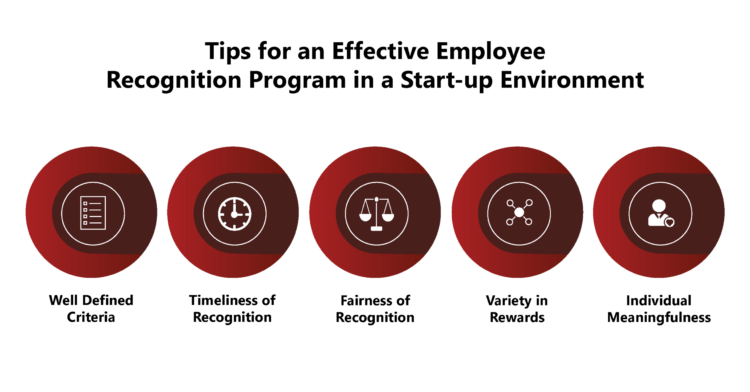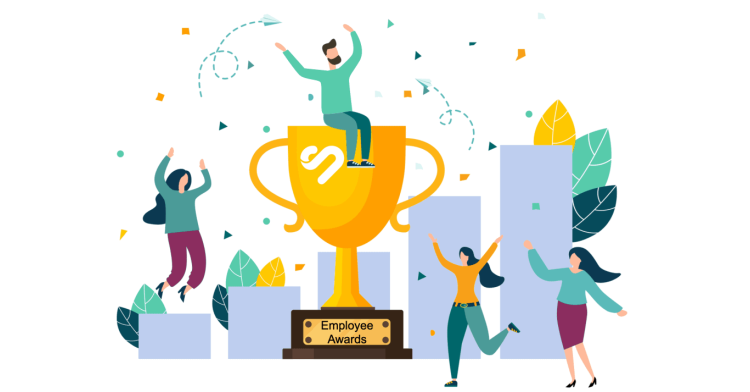1. Employee recognition in startups is crucial for motivating and engaging employees who often face high workloads and dynamic responsibilities.
2. Effective recognition programs in startups should include well-defined yet flexible criteria, timely and fair recognition, and a variety of meaningful rewards tailored to individual preferences.
3. Startups should ensure that recognition is innovative and impactful by understanding how each employee values appreciation differently.
4. Implementing thoughtful recognition programs can significantly boost employee performance and accelerate business growth.
Working in a startup is exciting but stressful, with dynamic goals, unclear roles, and chaos. Keeping employees motivated and engaged in a startup culture cannot be underestimated. While most large organizations have employee recognition programs, things need to be done differently in startups to get the best results.

Startups today are the most happening workplaces for young professionals.
It is primarily due to the learning and growth opportunities and the exposure to new technologies and business models.
However, most startups have small teams and employees have to take up multiple responsibilities and massive amounts of workload.
It requires employees to stretch beyond their usual capabilities and working hours to drive business growth.
It is true for all startups, whether they are self-funded, funded by investors, or part of a larger organization.

Therefore, in startup environments, recognizing and appreciating the efforts of employees can go a long way in establishing an emotional connect and sense of belonging with the organization.
Startups cannot conventionally run effective employee recognition; it requires a different mindset, mindful planning, and execution.

One of the key aspects of managing employee recognition is to make it meaningful for the employees individually.
Hence, it is crucial to better understand how each employee will likely respond to recognition.
It is generally a little easier in a startup, as the number of employees is usually smaller.
The critical elements of every effective employee recognition program in a startup are as follows:
1. Well-defined Criteria
2. Timeliness of Recognition
3. Fairness of Recognition
4. Variety in Rewards
5. Individual Meaningfulness


A startup organization needs to have well-defined criteria that form the base of its employee recognition program.
Employees should be recognized and appreciated not only for their achievements but also for their attitude and behavior.
The HR should ensure that the employees know the criteria for different rewards and recognition.
At the same time, the criteria should be flexible to meet the changing needs as the organization grows.

Recognizing and rewarding an employee’s efforts well in time will ensure the program’s effectiveness.
Any delays in the process can significantly negatively impact employee motivation.
Startups can address this by designating a specific day of the month for handing out rewards and recognition to eligible employees.
Alternatively, early-stage startups can acknowledge and appreciate employees regularly and on the go using a technology platform.

The most important aspect of ensuring the effectiveness of an employee recognition program is to ensure its fairness.
It is common for some employees to take credit for others’ work to get appreciation from higher-ups.
Recognizing such employees is unfair and can negatively impact employee motivation.
Hence, HR must ensure complete fairness in the process and reward only deserving employees.

Providing variety in the rewards given to employees is also something that startups should consider.
Offering the same rewards to different employees for diverse reasons makes the whole process seem formal and monotonous.
By adding a bit of variety, startups can keep the whole process innovative and interesting.
It would add a bit of surprise and excitement as employees would keep guessing until the very last moment.

Finally, the startups must ensure these rewards are meaningful for each employee.
They need to understand that every individual is different and perceives appreciation and recognition differently.
For some employees, proper recognition might mean publicly announcing their achievements. For others, it might be a few private praises from their seniors.
The same holds for rewards. For some, cash might have a higher value. For others, it might be a gift voucher or a sponsored training program.
Read 8 Creative Ideas for Startups to Recognize Employees and 5 Low-Budget Ideas for Employee Rewards and Recognition
Also read: The HiFives Case Study of Employee Recognition at a Startup
Considering the above points, startup organizations can develop truly effective and result-oriented employee rewards and recognition programs that can enhance workforce performance and motivation significantly, and accelerate business growth.

Lead author: Sagar Chaudhuri, the Co-Founder and CEO of HiFives. He is an HR Tech Evangelist with over 25 years of corporate and entrepreneurship experience. In the past, Sagar has worked in leadership roles with companies such as Genpact, Infosys, and ICICI Bank. He has an engineering degree from IIT Kharagpur and an MBA from IIM Lucknow. Connect on LinkedIn
To stay updated on the latest HiFives blogs, follow us on Twitter (@MyHiFives)